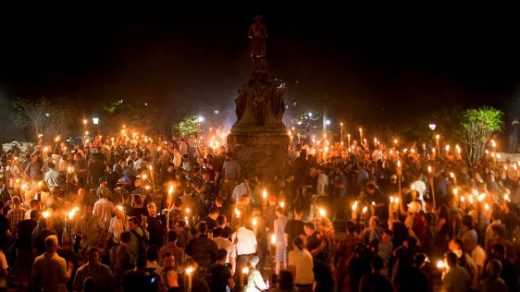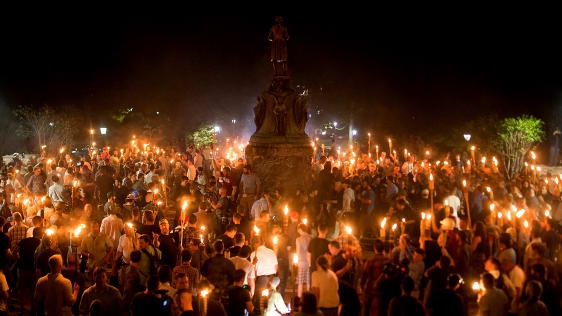Here’s how Trumpworld is spinning Trump’s refusal to condemn white supremacists
“That was a hot mess, inside a dumpster fire, inside a train wreck,” CNN anchor Jake Tapper said of Tuesday night’s first presidential debate in the general election.
His colleague, Dana Bash, put it more succinctly when she called the event a “sh**show.”
It’s hard to choose any single moment from the 90-minute-plus debate that could qualify as the nadir—there was less a bottom than a vacuum of negative space—but one electable candidate for the position would surely be the part where Donald Trump unambiguously refused to condemn white supremacist violence.
Over the years, the president has had many sordid flirtations with white supremacist groups, dancing on the precipice of distancing himself whenever called out forcefully enough—without ever completely doing so. The closest he’s ever come before to straight-up embracing them was with his infamous “very fine people” remarks in the wake of the white supremacist murder of protester Heather Heyer in Charlottesville, Virginia, in August 2017. Those comments were a corrective to a previous statement, in which Trump broadly condemned “racism,” which he would later call the biggest regret of his presidency. (The initial comments, not the “very fine people” ones.)
It’s not all that shocking to see Trump continue his soft embrace of the white supremacists within his base, only how much more direct he’s become about it at this late stage of his first term.
What might be something of a shock is the difference in how right-leaning media and GOP politicians respond to it—if today’s examples are any indication.
Fox News’s Greg Gutfield, for instance, said of Trump’s Charlottesville remarks in 2017, “The only obvious answer I have for what he did is pure ignorance.”
South Carolina Republican Senator Lindsey Graham said that Trump “took a step backward by again suggesting there is moral equivalency between the white supremacist neo-Nazis and KKK members who attended the Charlottesville rally” and the people demonstrating against them, while Senate Majority Leader Mitch McConnell merely swiped at the groups themselves, rather than the person who endorsed them: “We all have a responsibility to stand against hate and violence, wherever it raises its evil head.”
So, how are the folks at Fox News, in Trumpworld, and in the GOP Congress reacting to the president’s impossible-to-misinterpret refusal to condemn white supremacist violence?
Here’s Fox & Friends cohost Brian Kilmeade suggesting Trump simply did not hear moderator Chris Wallace correctly, despite video evidence to the contrary.
Brian Kilmeade: “Donald Trump ruined the biggest layup in the history of debates by not condemning white supremists. I don’t know if he didn’t hear it, but he’s gotta clarify that right away. … Why the president didn’t just knock it out of the park, I’m not sure.” pic.twitter.com/Qo52jBDTPl
— Bobby Lewis (@revrrlewis) September 30, 2020
Here’s Trump campaign spokesperson Hogan Gidley explaining on CNN that Trump actually meant the exact literal opposite of what the words he used mean.
National Press Secretary for the Trump campaign Hogan Gidley on Wednesday tried to clean up Pres. Trump’s call for the Proud Boys to ‘stand by’ during Tuesday’s debates, saying that the remark was actually telling the hate group to “get out of the way.” pic.twitter.com/EZOQpsnuOC
— TPM Livewire (@TPMLiveWire) September 30, 2020
Gidley’s deflection was echoed almost verbatim by fellow Trump mouthpiece Jason Miller later in the morning.
Trump campaign adviser Jason Miller says on @MeetThePress Daily that when Trump told the Proud Boys to “stand by” last night, he meant “stand by the wayside and get out of the way” of law enforcement.
— Sahil Kapur (@sahilkapur) September 30, 2020
Finally, here’s Senator Tim Scott, Republican from South Carolina, who vouched for Trump’s benevolent character when the cameras were off during the recent Republican National Convention. He also has concluded that Trump didn’t mean what he said when he said it, but if he did, well, nevertheless, essentially.
Reporter: “Do you find that concerning, the president’s refusal last night during the debate to condemn white supremacist groups?”
Sen. Tim Scott: “I think he misspoke. I think he should correct it. If he doesn’t correct it, I guess he didn’t misspeak.” pic.twitter.com/qxDTrg7ulT
— NBC News (@NBCNews) September 30, 2020
No word yet from Scott on how he will feel if we determine conclusively that Trump did not, in fact, misspeak when he very clearly refused to denounce white supremacist violence.
(25)



